Stories have the power to connect, to give us the chance to see that we are more similar than we are different. Each woman, and each family, has a story. And this World Doula Week, we are taking the opportunity to bring some of those stories to you.
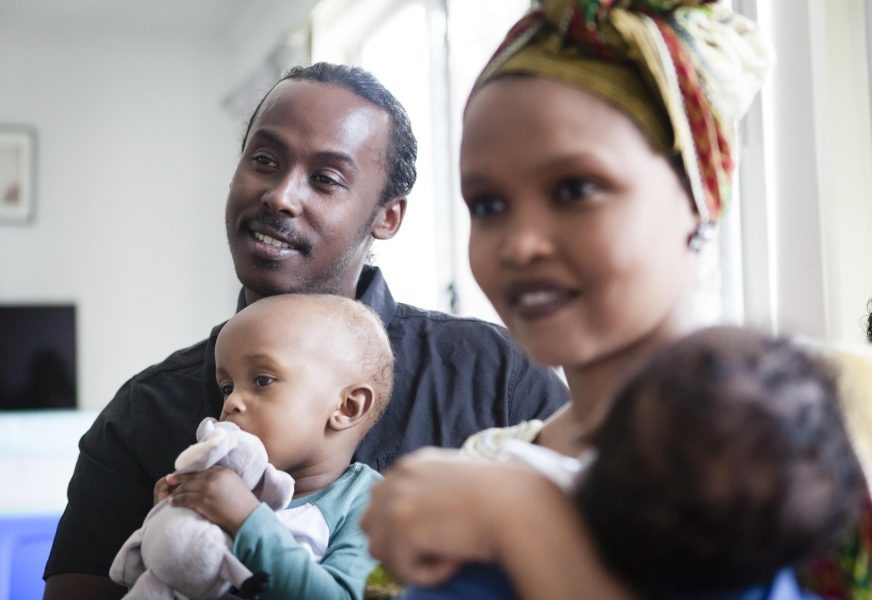
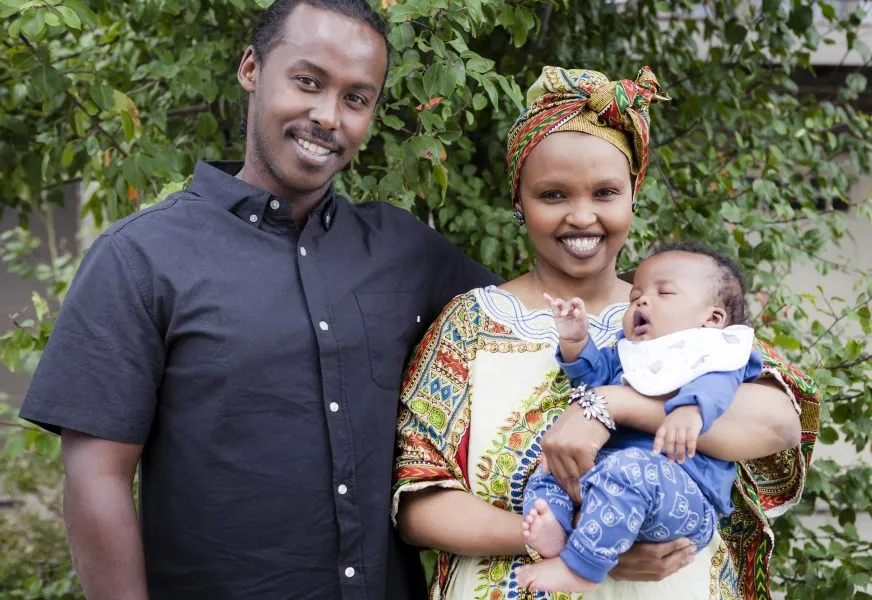
Meet Yasmin and Maxmud. Both Somali-born and in their early 30s, they had the support of a doula for the birth of their fourth child, Cilmi, in December. Here they share a few things about themselves and their experience.
Yasmin: Hi, I’m Yasmin. I work at the Austin Hospital as a Health Assistant. Before that I used to work in aged care. I was born in Somalia. By the time it was the war, we moved to Sweden, me and my family. Our father was there before us so he sponsored us. Ten years ago, I met Max in Sweden and we got married. I came to Australia in 2009 but it was just on a tourist visa. When I went back to Sweden I was pregnant with our first child, and in 2011 when I got my visa to come and stay in Australia I came with our daughter Aisha.
Maxmud: My name is Maxmud, I’m 32 and I am a concreter. I love it! I had a big career change — prior to that I was in insurance for a long time. I did that for about nine years. For the last three years I’ve been doing concreting. I hated being inside, it just isn’t for me. I think I’ve found my calling now.
I left Somalia when I was six. We first went to New Zealand in 1992–93. Then, my Dad left for Australia in 1997. I finished that primary school year and then we joined him in Perth in 1998. I moved from Perth really young at maybe 16. I had a sister in Melbourne and so I moved here in 2002. So Australia has been home for me for the last 20 years or so now. I am a citizen, Yasmin’s a Swedish citizen and an Australian permanent resident. We have three boys and a girl — our daughter Aisha is the oldest, then Knann, Mikhail and Cilmi. I have 7 sisters and they’re all amazing. I’ve always been around women.
Maxmud’s sister, Nafisa, connected with Birth for Humankind in 2016 when she was pregnant. As a young mum, she attended our Mothering 101 program for young pregnant women and was then matched with a doula, Elizabeth, through our doula support program, for extra support during her pregnancy and birth. You can read their beautiful story here.
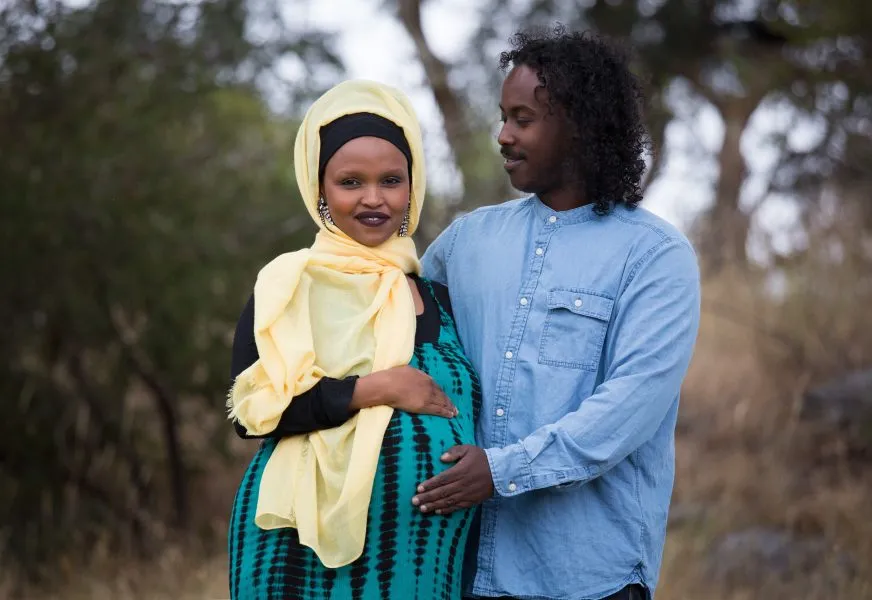
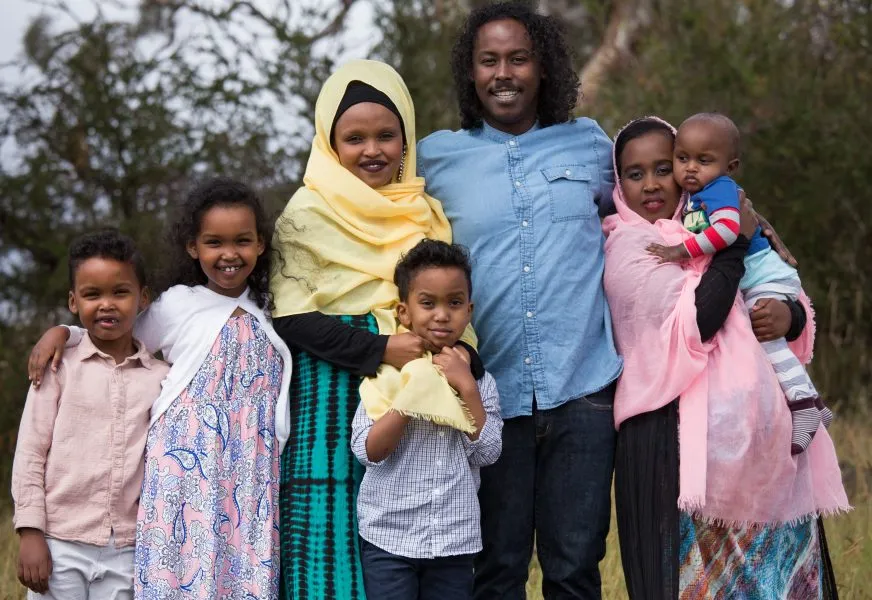
Nafisa lives with Yasmin and Maxmud so when Yasmin fell pregnant, she wondered if she, too, could have the support of a doula through Birth for Humankind.
Yasmin: When Nafisa was delivering, Elizabeth was amazing in terms of supporting her emotional needs. Just, you know, someone touching you, rubbing your back, thinking for you when you’re in so much pain. I looked at her and thought ‘why did I have three babies already and why didn’t I have a doula?’ I didn’t know that doulas existed before. Elizabeth was very gentle, she was kind, listened to what Nafisa wanted instead of dictating what she wanted. [When I fell pregnant] I thought I’m going to try my luck and ask her ‘can you be my doula?’ and, thankfully, she said ‘yes, I can be’.
You had been through the process of having a baby in Australia before so you knew what to expect in a lot of ways. How was your experience different this time with the support of a doula?
Yasmin: It was heaps different, really different. She made it easier for me. I was induced to have him earlier because I was having some health problems. Having her there was like, I don’t know, having my own mum there. Thinking for me, looking after me, just supporting me through everything — so I actually think it was a big difference having her there. She knew a lot of things, she knew what techniques to use, she knew the right movements, she knew different positions that I wouldn’t use usually in labour. I felt more comfortable. I did not have much faith before. It was because of her that I did this time. She was all the time saying to me ‘don’t worry’, all the time if there was something that was a bit concerning, she was just reassuring me saying ‘you don’t need to stress, there’s a lot of people to look after you here, don’t worry’.
Maxmud: Elizabeth was really patient with her. When Nafisa was pregnant she was going through a lot so I was very protective of her and who was coming into contact with her, without being too intrusive because she’s an adult. More than anything, I was just trying to guide her so she was getting the best support she could besides us. Elizabeth came through. She was like her mum, when Nafisa needed that kind of love and unconditional support. That really touched us, for someone to do that voluntarily. She puts in 110%. Yasmin thought ‘I’d love that too’.
From your experience, what are some of the main ways that a doula can support you?
Yasmin: I think doulas are important in explaining things, giving you different options. When you’re at the hospital everything is about time, it’s rush, rush, rush. Sometimes you don’t understand things and you’re confused about what you want, what kind of decision you should make and no one’s sitting there explaining to you more. Doulas are like ‘do you understand, do you want me to explain to you?’ They do more explaining to you and then you can make a decision afterwards. Maybe you wouldn’t have chosen that thing if you hadn’t been rushed and you’ve just chosen things that may not be right way for you.
I remember Elizabeth telling me, even though I knew heaps of things, she would tell me like ‘it’s okay, don’t worry’, she was explaining things to me that made me just *breathes out*. She would just calm me down, ask me questions, call me to check in. I don’t think the hospital would call me to see how you’re doing. Having a doula was having someone to reassure you.
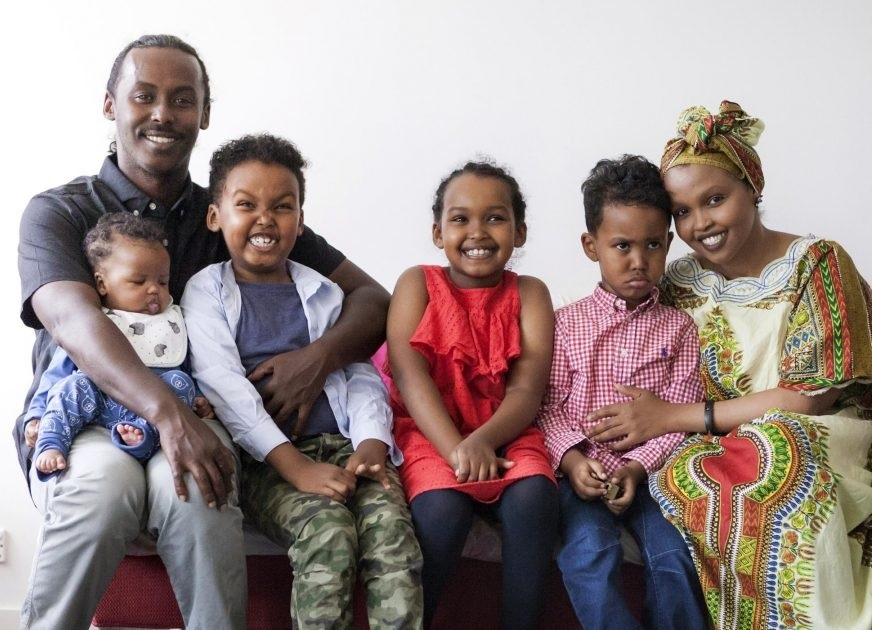
Maxmud, can you talk about the support a doula can provide you as the non-birthing partner?
Maxmud: Even though I’m pretty experienced [as a parent], she’s (the doula) still doing more than myself in that birthing suite. I worry about ten million other different things outside of that room, but she’s focused 110%. I remember one point when she’s massaging her whole body for what seemed like over an hour. It was perfect, it meant I didn’t have to cop all the t-shirt pulling!
It gave me a sense of peace knowing that she was there and the support that she was giving to Yasmin was just a load off my back. It was just the extra hand that we needed.
Yasmin: She made him calm ’cause men can feel like ‘oh my god what am I doing, what am I doing here, you know I can’t take the pain away’, and she made him calm. She just relaxed everyone in the room.
Now that you’ve both experienced the process of pregnancy and birth with and without a doula — do you think that a doula offers something different in that space?
Yasmin: Absolutely. I think even the hospital staff were like ‘we wish there was a person like you here’, because they can’t be there all the time for you, they can’t give you this one-on-one support, always there, giving you that extra hand whenever you need because they’re just going to come and check you and then leave. One of the midwives actually asked Elizabeth ‘can I help, how can I become a doula? Is there a program, what organisation is there for me so I can? Even me I actually would love to now become a doula. Maybe when Cilmi’s a bit older. Especially because there’s so many women in our community that I would love [to support], you know they don’t speak the language, so just to be there and support them.
Maxmud: Hospitals should definitely have doulas. I would definitely recommend hospitals actually having doulas because there’s no perfect families out there, which means there’s a lot of people out there that need support. It’s a very valuable service that this program provides.
As you know, our service is set up purely to support people who wouldn’t otherwise have access to support or be able to afford it. Do you think that doulas can be particularly important for women from refugee and migrant backgrounds, or women without partners and families?
Maxmud: There are a lot of vulnerable women out there, and I’ve seen that first hand with my sister. That support network’s very valuable.
Yasmin: I would hate to think what I would do just being there on my own [if I] did not have family here, did not have any one else, new to the country, did not know anything about the system, what the healthcare is. It’s honestly good to have someone there just to hold your hand. When you’re feeling the most vulnerable, she can just tell you ‘it’s ok, you’re going to be okay’. It’s lucky actually that Elizabeth was there because Maxmud just went downstairs for literally like five minutes to let his sister in and the baby came.
Maxmud: That’s right! I missed the birth. Lucky Elizabeth was there… I can only imagine if Elizabeth wasn’t there.
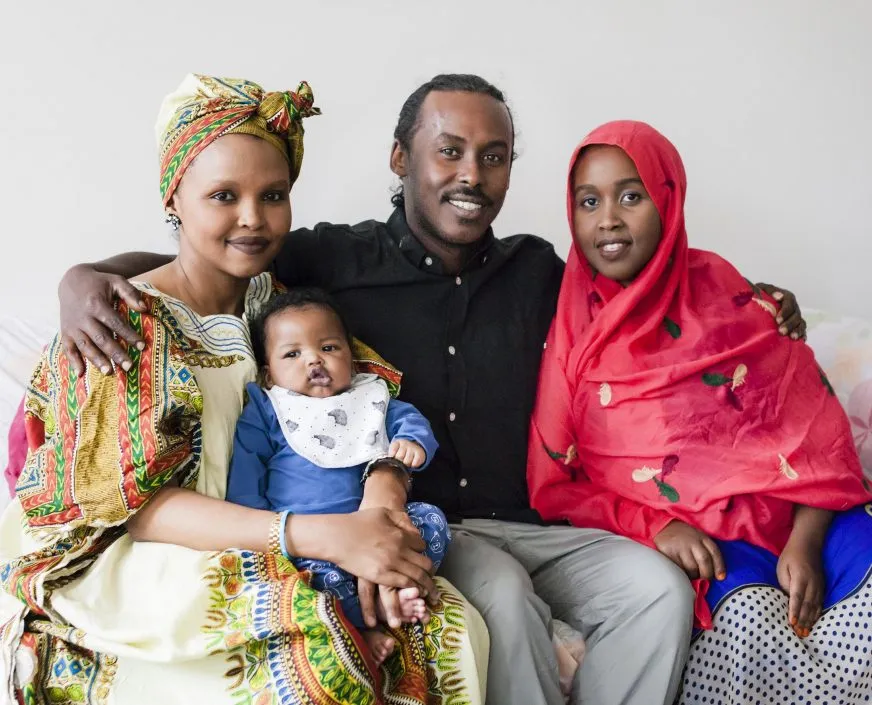
In addition to our Doula Support Program, Birth for Humankind also has programs to support women from migrant backgrounds to get the information they need to understand the Australian maternal health system. Why do you think that’s important?
Yasmin: It’s great. I see it with women from my background or from my culture, there’s heaps of women that don’t understand English that just don’t know what they’re signing, they don’t know there’s different options, they don’t know anything. It could help them.
Like for me, I would prefer that people ask and don’t make assumptions about who I am and what I believe in. Maybe I’m comfortable with things that someone else wouldn’t be comfortable with, I hope people just ask and not assume things beforehand.
Maxmud: I think it was yesterday at work this guy was asking me why she wears her headgear. It’s like ‘ok well instead of listening to Today Tonight about Muslims and who they are, pick up a book, or go to the Internet now and look it up.’ Over the years, you do come across those general assumptions. I try hard to educate people and to raise good and respectful humans.
You’re wonderful parents and it’s been such a pleasure to sit down and learn more about you. Was there anything else that you would like to tell people about your experience?
Yasmin: It’s been such a big help, honestly — big, big, big, help. [Our doula] was an amazing support system for me. I’m enjoying my son more than with the others and I don’t think I would have as much without Elizabeth. It made me look at Elizabeth and what she did and think ‘maybe I could do that, if I had a couple of hours, maybe I can volunteer too. It made me think that maybe I could become a doula.
Maxmud: If I could tell another father who was deciding whether or not to have a doula I would say: have a doula! It makes the world of difference, especially for fathers who’ve never had a child before. It’s the biggest life experience that you can ever have. Nothing prepares you, except a doula! She’s been there, done that, seen it a hundred times over, although everyone is different, the process is still the same.
We are so grateful to people like Yasmin and Max for sharing their experiences being supported in our Doula Support Program. You can support more families like theirs by donating to our World Doula Week campaign.
